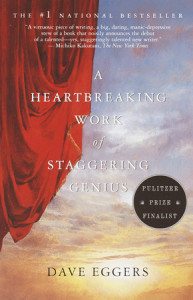Review: A Heartbreaking Work of Staggering Genius by Dave Eggers
[dropcap]W[/dropcap]ith such an appealingly vain and self-satisfied title, it would be easy to approach A Heartbreaking Work of Staggering Genius through a darkened lens of cynicism. Unfortunately, those with a penchant for destructive dismissals will be left utterly short-changed by this book. That’s because it’s brilliant.
Even the most close-minded of readers will not be able to resist the incredible beauty and power that ruminates within Dave Eggers’ prose
 A Heartbreaking Work of Staggering Genius is a big, sprawling, populist book published at the turn of the twenty-first century (now an oddly forgotten best-seller found in the memoir section of the book store), with what appeared to be exaggerated praise lavished on it from cover to inside page. In reality, this book should be among the modern classics, so ingenious is its conception; it is an utterly flawed but utterly perfect masterpiece.
A Heartbreaking Work of Staggering Genius is a big, sprawling, populist book published at the turn of the twenty-first century (now an oddly forgotten best-seller found in the memoir section of the book store), with what appeared to be exaggerated praise lavished on it from cover to inside page. In reality, this book should be among the modern classics, so ingenious is its conception; it is an utterly flawed but utterly perfect masterpiece.
The book details the early struggles of Dave Eggers as a creative but frustrated young man who, after the deaths of both his parents within a month of one other through cancer, is thrust into an exceptionally challenging situation. He has to raise his younger brother Christopher, ‘Toph’, with the help of his admirably patient and tireless sister, Beth.
If this description appears to suggest a study of one’s emotional journey in a nauseating Nicholas Sparks fashion, think again. From a plot perspective, the story is woven expertly with humour, enviable pop-cultural knowledge, and a real understanding of the joys of thinking, being young, and of writing and living in the United States during the late 1990s.
All of this happens through a glorious and sugary haze of semi-fiction. It is embedded with lucid prose and strays marvelously into the cycle of Eggers’ thoughts. For the most part, it simply goes beyond the realms of ordinary books. Through majestic levels of word-craft, Eggers blends his real-life situation and experiences with those of fiction and, through effective adjustment, also creates a linear tale from his life experiences.
For such an act of authorial authority, it doesn’t feel contrived
Instead of being comparable to a creaking, monolithic machine, the book reads in an almost illusionary way, filled with an addictive blend of memories and ideas.
 Eggers’ appetite for intimately consuming the reader’s attention, whilst managing also to throw them in a contagiously appealing way, is staggeringly effective. He breaks the fourth wall continuously, he turns lengthy sections of prose into play format, and regularly gets distracted by the thoughts of his conscience or the ramblings of those interacting with him as he writes. Eggers even puts footnotes on footnotes, embarks on seven page digressions, and has a burgeoning codex of chunks of the book that didn’t make the final draft. He puts these at the beginning of his book, with the acknowledgements, alongside a few observational rules for the reader before they start Chapter One.
Eggers’ appetite for intimately consuming the reader’s attention, whilst managing also to throw them in a contagiously appealing way, is staggeringly effective. He breaks the fourth wall continuously, he turns lengthy sections of prose into play format, and regularly gets distracted by the thoughts of his conscience or the ramblings of those interacting with him as he writes. Eggers even puts footnotes on footnotes, embarks on seven page digressions, and has a burgeoning codex of chunks of the book that didn’t make the final draft. He puts these at the beginning of his book, with the acknowledgements, alongside a few observational rules for the reader before they start Chapter One.
In the book, Eggers talks about sex, television, feelings of isolation, alcohol, and at times it seems to become a travel log of his adventures across the United States. There are large parts devoted to job interviews, gossip, relationship problems, food habits, financial worries and his career prospects. All of these things are interesting but ordinary. These are not unique thoughts, rather it is what he does with these thoughts, and how he describes them, which is so entertaining.
Eggers proves himself to be utterly relatable as his struggles typify those of so many human beings. However, as mentioned earlier, he still comes across as utterly unique through his writing methods and the idiosyncrasies and attributes of his character, all of which he lays bare on the page. Who else would convert a retelling of his job interview into a conversation between himself and his sub-conscious?
The work is wrenchingly painful too. There was no exaggeration with the ‘heart-breaking’ part of the title – a title which, by the way, he explains satisfactorily quite early on.
Through the blurb-established deaths of his parents, and the natural issues anyone has in raising a pre-teen child, the stress of his life is exposed as being regularly overbearing. This continues no matter how wonderful he perceives Toph, or however much he tries to get on top of things.
 More strikingly, Eggers’ own true feelings about himself, the festering self-doubt of his own abilities, and the difficulties of fostering his own identity are notable parts of the book. These all impact his behaviour, largely because they are exacerbated by the more conventional heart-breaks like relationship break-ups, but also coming to terms with his parents’ deaths, his relationship to them, and the position he has inherited from them. In truth, the biggest struggle is the most human of all struggles, the most Aristotelean of all concerns: the real need to have purpose, to have meaning.
More strikingly, Eggers’ own true feelings about himself, the festering self-doubt of his own abilities, and the difficulties of fostering his own identity are notable parts of the book. These all impact his behaviour, largely because they are exacerbated by the more conventional heart-breaks like relationship break-ups, but also coming to terms with his parents’ deaths, his relationship to them, and the position he has inherited from them. In truth, the biggest struggle is the most human of all struggles, the most Aristotelean of all concerns: the real need to have purpose, to have meaning.
Occasionally, there are passages which have clear resemblances to other works. At times, it reminds one of Foster Wallace at his most lucid and detailed, or the zenith of anecdotal storytelling through the likes of Laurie Lee. At others, it appears most strikingly similar to the work of Samuel Beckett; not in writing style, but it does leave one with lingering aftertastes of the Theatre of the Absurd.
However, mostly the book is just about Eggers. The reader instantly understands that the writer is wonderfully absorbed by his own feelings, experiences, and the overbearing cornucopia of cultural fruit. Fruit on which he dutifully gorges whilst riffing off the occasional quirky thought from his own subconscious.
Quite simply, the work is the true and real embodiment of Dave Eggers. In this case, not only is it an extension of his body, like an additional limb, but rather it is him.
There is only one way in which to describe this book: human
The symptoms of the human condition can be seen with the occasional over-bloated passage, or the out-of-tune joke, or the occasionally boring foray into his life which over-emphasises a previously-made point. Like any other human, he places focus on many things which we would find dull, or breezes over something joyful. Despite his attempts to linearise the story for our entertainment, it is at times a rugged read.
Yet we sit with Eggers through this, because we develop a real understanding of who Dave Eggers is, and develop a belief that it matters to hear his story.
A Heartbreaking Work of Staggering Genius is flawed, but what flaws they are. The book is brilliant because of them; it is more human for them. And clearly, it is written about one of the most interesting and engaging humans to have picked up a pen.
Image Credits: Header (huffingtonpost.com), Image 1 (Flickr/Erik Charlton), Image 2 (randomhouse.com), Image 3 (Flickr/Elliot Margolies).

Comments